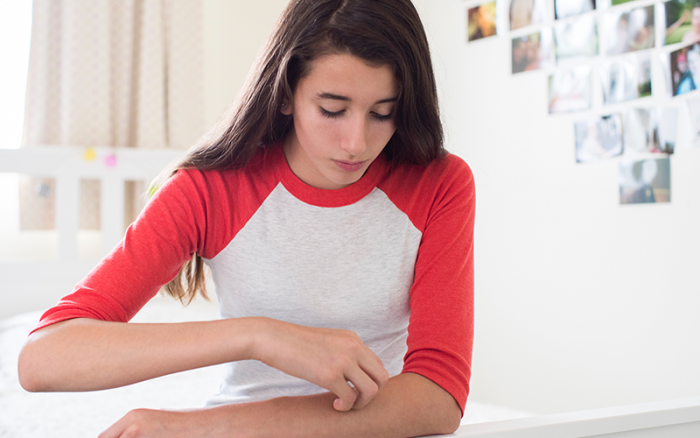For people who get psoriasis, the condition doesn’t show up until they’re between the ages of 15 and 30. But psoriasis in children under 10 occurs in about 10% of people who are affected by it. Learning to manage psoriasis can be a challenge for both parents and the child.
“Psoriasis is an unpredictable condition that can flare up and disappear throughout their lifetime,” says Dr. Russell Peckham of U.S. Dermatology Partners Cedar Park. “With the help of a good dermatologist and a clear plan of what you need to do, you can make it easier for your child and for yourself.”
The earlier that psoriasis occurs, the more likely it is to recur, which makes learning ways to manage it particularly important. Dr. Peckham offers these five tips for managing your child’s psoriasis:
No. 1: Learn as Much as You Can About Psoriasis
As with any condition that affects your child, self-education is important. Knowing how psoriasis is triggered and what you can do to avoid or minimize triggers will be a valuable lifelong lesson.
“Psoriasis is an autoimmune disorder, which means it is a condition in which the body’s immune system attacks its own healthy cells,” Dr. Peckham says. “In this case, the body begins to make skin cells very quickly, which causes a buildup of skin that appears as lesions on a certain part of the body.”
The extra blood being pumped to the area gives the lesions their red coloring, and it can be made worse by irritations like scratching or rubbing. In addition to being uncomfortable and, in some cases, painful, psoriasis can also cause children to feel anxious or worried.
No. 2: Learn Your Treatment Options
There are many different treatment options for psoriasis in children, so you’ll want to work with a dermatologist who you trust — and who can find the treatment that works best for your child.
Treatments will fall into one of three categories:
- Light therapy, which uses natural or artificial ultraviolet light as a form of treatment
- Topical treatments, which can include creams, ointments, and lotions
- Injected or oral medication, which are usually used when the psoriasis has not responded to other treatments or if it is particularly severe
“You don’t always find the right fit immediately, or you might use a combination of therapies,” says Dr. Peckham. “That’s why you need to work closely with your dermatologist to find the most effective treatment for your child.”
No. 3: Build a Healthy Lifestyle
Good health habits play a central role in managing psoriasis in children. Stress is a common trigger of flare-ups, so in addition to trying to avoid stress-inducing situations, your child could benefit from learning stress reduction techniques such as meditation or mindfulness.
Other healthy habits to instill in your child are:
- Teach them to eat a healthy diet. The nutrients in fruits and vegetables can help prevent some of the diseases associated with flare-ups.
- Watch their weight. Over time, psoriasis can contribute to heart damage, and children with psoriasis are more at risk for obesity. Controlling their weight through proper lifestyle habits is a lesson that will last them for life.
- Get plenty of sleep. Sleep is essential for good health and to allow the body to heal itself. Teach your child to get seven to nine hours of sleep each night.
- Make time for exercise. Exercise, whether it’s a walk around the block, riding their bike or playing catch, is a good way to boost the immune system. Making sure they integrate movement and exercise into their daily routine can help keep flare-ups at bay, and as a bonus, it will help them manage their weight, combat stress and even help them sleep better.
No. 4: Spend Time Outside
Being outside has many benefits; being in nature is known to have a positive effect on your moods, and research shows that natural light — in limited amounts — has been shown to have a healing effect on psoriasis.
“While sunshine can be helpful for clearing up a bit of psoriasis, you need to make sure that you’re using sunscreen every time your child goes outside,” Dr. Peckham says. “Also, make sure the sunscreen formula is hypoallergenic, so it doesn’t irritate the skin.”
He added that some medications may make your child more sensitive to light, raising the risk of sunburn or sun damage. Always check with your dermatologist about the side effects of any prescriptions given to treat psoriasis.
No. 5: Provide Emotional Support
Children with psoriasis can experience loneliness, isolation, and depression. They may feel embarrassed and ashamed. Providing them with access to a therapist, or finding a support group where they can talk about their feelings and meet others who share their condition, can provide them with important coping skills.
“Managing psoriasis in children is something that, like every condition, takes some adjustment and has a bit of a learning curve,” Dr. Peckham says. “But parents need to know that it’s something that can be addressed, and if you can work closely with your dermatologist, you can help control many of their symptoms.”
Looking to Visit a Dermatologist for Psoriasis?
We have multiple locations throughout the country, so fill out our simple online form to get in touch with us. One of our local team members will reach out to you shortly to answer your questions or schedule an appointment for you to visit us soon.
Find a location near me
or


